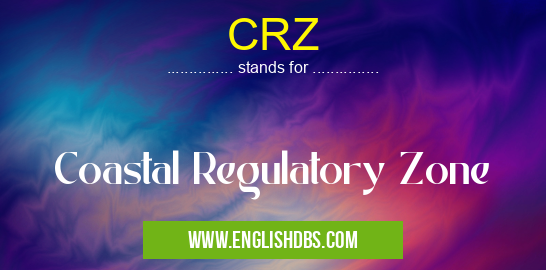What does CRZ mean in UNCLASSIFIED
CRZ stands for Coastal Regulatory Zone. It is a legal provision in India that regulates activities within coastal areas and aims to protect and conserve fragile coastal ecosystems.

CRZ meaning in Unclassified in Miscellaneous
CRZ mostly used in an acronym Unclassified in Category Miscellaneous that means Coastal Regulatory Zone
Shorthand: CRZ,
Full Form: Coastal Regulatory Zone
For more information of "Coastal Regulatory Zone", see the section below.
Purpose and Objectives
- To prevent haphazard development and protect coastal environments.
- To regulate activities that may cause pollution or environmental degradation.
- To preserve the natural beauty and biodiversity of coastal areas.
- To promote sustainable use of coastal resources.
Zones and Regulations
CRZ divides coastal areas into different zones and specifies specific regulations for each zone. These zones include:
- CRZ I (High Hazard Zone): Critical areas, such as beaches, mangroves, and coral reefs, where development is strictly prohibited.
- CRZ II (Developed Area): Areas with existing infrastructure and development, where certain activities are allowed with conditions.
- CRZ III (Other Areas): Areas outside CRZ I and II, where development is generally permitted, subject to environmental impact assessments.
Permitted and Prohibited Activities
Permitted Activities:
- Agriculture and horticulture
- Fishing and aquaculture
- Tourism and recreation
- Ports and harbors
- Essential infrastructure projects
Prohibited Activities:
- Industrial development
- Mining and quarrying
- Discharge of untreated sewage and waste
- Construction of new buildings on beaches and sand dunes
Enforcement and Implementation
CRZ regulations are enforced by the Ministry of Environment, Forest and Climate Change (MoEFCC) and state coastal zone management authorities. Violations can result in fines, imprisonment, and demolition of illegal structures.
Conclusion
CRZ is a crucial legal framework that plays a vital role in protecting and conserving India's coastal ecosystems. By regulating activities and ensuring sustainable development, CRZ helps maintain the ecological integrity of coastal areas for present and future generations.
Essential Questions and Answers on Coastal Regulatory Zone in "MISCELLANEOUS»UNFILED"
What is Coastal Regulatory Zone (CRZ)?
The Coastal Regulatory Zone (CRZ) is a legal framework that regulates activities and development within specific areas along India's coastline. It aims to protect the ecological and environmental integrity of coastal ecosystems while promoting sustainable development.
What are the different categories of CRZ?
CRZ is divided into four categories:
- CRZ-I: Protected areas, such as ecologically sensitive areas, mangroves, and coral reefs.
- CRZ-II: Built-up areas that require regulation to prevent haphazard development.
- CRZ-III: Areas that are relatively undeveloped and where construction is allowed with certain restrictions.
- CRZ-IV: Coastal waters, including tidal flats and estuaries.
What activities are regulated under CRZ?
CRZ regulations restrict various activities within its designated zones, including:
- Construction of buildings and structures
- Land reclamation and dredging
- Industrial development
- Mining and quarrying
- Tourism and recreational activities
What are the objectives of CRZ?
The primary objectives of CRZ are to:
- Conserve and protect coastal ecosystems
- Prevent degradation of water quality and marine life
- Regulate development to minimize environmental impacts
- Ensure sustainable use of coastal resources
- Protect the rights of traditional fisherfolk and coastal communities
Who is responsible for implementing CRZ regulations?
The Ministry of Environment, Forest and Climate Change (MoEFCC) is the nodal agency responsible for formulating and enforcing CRZ regulations. State Coastal Zone Management Authorities (CZMAs) are established to implement and monitor CRZ regulations at the state level.
